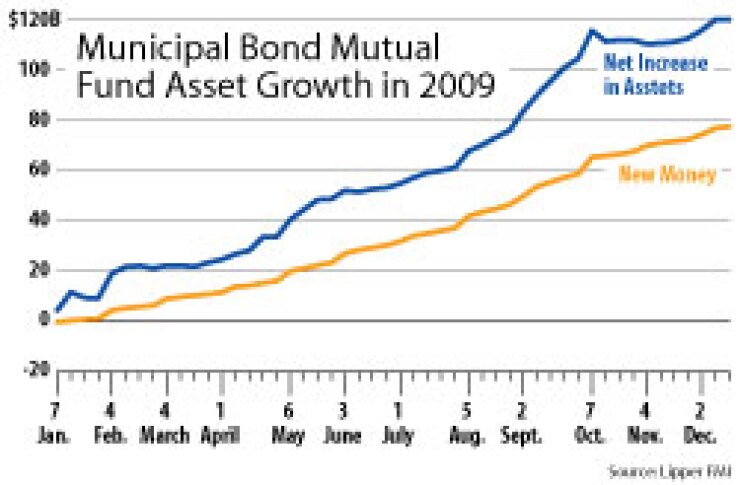

Municipal bond mutual funds keep garnering new money at a steady clip as investors continue to grow bored waiting on the sidelines.
Investors entrusted $663.1 million to municipal bond mutual funds during the week ending Dec. 16, according to Lipper FMI.
This is typical of the weekly inflow that mutual funds have grown accustomed to in the last 10 weeks: still high, just not as high as it was earlier this year.
For most of 2009, municipal bond mutual funds have enjoyed a gusher of cash from investors.
Funds have reported $77.38 billion in new cash from investors in 2009. Until this year, the industry record for new money in any 52-week period was less than half that sum.
Complemented by $42.39 billion in market gains, the inflows have propelled municipal mutual funds' assets by 36% this year, to $463.59 billion.
The tide of new money has clearly slowed down.
Over the past 10 weeks, investors have poured an average of $1.22 billion a week into muni funds. That would have been a record prior to last year.
This year, though, it is moderation. Funds were reporting well more than $2 billion a week on average for much of the fall, at one point averaging more than $2.8 billion over a 10-week period ending in early October.
What is behind this wave of money?
For one thing, municipals have done very well in 2009.
The S&P National AMT-Free Municipal Bond Index is up 12.35% for the year. The average yield to maturity on the bonds in the index had plunged to 3.78% from nearly 4.5% at the start of the year.
In a note to clients, J.R. Reiger, who manages the index, said the key factors driving prices have been investors seeking the relative safety of municipal bonds, the decreased supply of tax-exempt bonds, and expectations of higher taxes.
A more technical factor is the restlessness of idle money.
At the apex of the credit crisis last year, hundreds of billions of investor dollars scrambled for safe perches in just a few months.
Households added almost $250 billion to bank deposits and other secure warehouses for cash in the fourth quarter of 2008, according to the Federal Reserve.
Money market funds, which invest in ultra-safe and ultra-short-term instruments to offer clients the equivalent of cash, attracted $385 billion of scared money in the fourth quarter last year.
With the economy growing again and risk appetites strengthening, those sidelined with money have grown impatient.
Tax-free money market funds — which many analysts say compete with municipal mutual funds for tax-paying investors' attention — yield a meager 0.03% on average, according to iMoneyNet, a record low.
The Fed last week offered no hint it plans to raise its target for interest rates anytime soon, meaning investors keeping their cash in money funds are looking at essentially zero returns for the foreseeable future.
Chris Johns, who manages a Colorado mutual fund at Aquila Group of Funds, said much of the money hitting municipal mutual funds this year is coming from investors shuttling money out of cash.
Tax-free money funds have coughed up $88.87 billion this year, or more than 18% of their assets at the beginning of the year.
"When you talk with the retail brokerage community, you get a lot of people that are really concerned about their cash investments," Johns said. "That's all they talk about with clients because the yields are nonexistent."
Municipal mutual funds are a logical alternative, Johns said. For a little extra maturity and credit risk, mutual funds can offer far better yields. Johns' $246 million fund currently yields 3.74%.
Phil Fischer, municipal strategist at Bank of America Merrill Lynch, in his final strategy report before retiring, said the Fed's decision to keep rates low will ensure "the outflows from money market funds into mutual funds will continue."
In his latest weekly report, Municipal Market Advisors' Matt Fabian cited three reasons for the "strongly positive" fund flows this year: the disdain for more severe types of risk, cash migrating out of money market funds, and people chasing momentum.
The first two of these supports remain, if not all three, he said. Fabian does not expect the flows to reverse before January, when reinvestment money will provide yet another pillar of support for funds.
In a note Friday, municipal strategists from JPMorgan said it is common for cash to exit money market funds more rapidly toward the end of the year. They expect money market outflows to pick up in the next few weeks.
Tax-free money markets shed nearly $3.5 billion last week, according to iMoneyNet.





